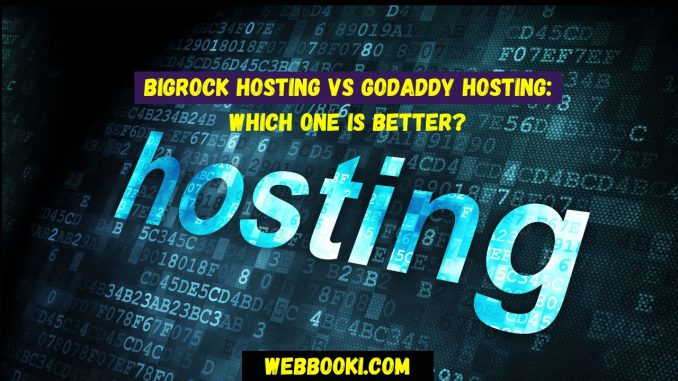
BigRock and GoDaddy could be two of the most renowned names when it comes to web hosting. Both companies offer a wide array of hosting services, but each has different strong points. Let’s break down their offerings, comparing everything from performance to pricing and features to customer support.
1. Performance and Reliability
Both BigRock and GoDaddy offer reliable hosting with good uptime guarantees. GoDaddy enjoys a good reputation for uptime at an approximate rate of 99.9%. Hosting a massive network of data centers, GoDaddy provides quality infrastructure to host small, medium-sized, and large websites. BigRock, on its side, also offers reliable uptime of 99.9%.
While the infrastructure is solid at BigRock, the generally larger global presence and infrastructure of GoDaddy might mean better speed and redundancy for users with a global audience.
2. Types of Hosting Plans
Both BigRock and GoDaddy offer a wide range of hosting plans, including shared hosting, VPS hosting, dedicated hosting, and managed WordPress hosting.
BigRock is primarily affordable shared hosting, making them the first choice among freshers or small businesses whenever cheaper options are sought. BigRock does have VPS and dedicated hosting, too, but it’s all about entry-level hosting.
GoDaddy is bigger and, therefore, grants a wider variety of services, including advanced managed WordPress hosting, cloud hosting, and even specialized plans for resellers and developers. It’s more scalable, especially for businesses with more advanced needs or higher-traffic websites.
3. Pricing
Pricing is one of the main factors in choosing between these two hosting providers. BigRock has relatively lower starting prices for shared hosting plans compared to GoDaddy. Their basic shared hosting plans can cost as low as $2.99/month for introductory rates, thus making them quite attractive for budget-conscious users. Web hosting renewal rates are higher after the initial term.
GoDaddy primarily follows the idea of promotional pricing, which starts at $5.99/month for shared hosting plans. While the introductory rates are a bit higher than BigRock’s, GoDaddy’s feature set and scalability make it a better choice for larger or more demanding websites.
4. Features
BigRock provides the basic requirements such as unlimited bandwidth, one-click installs for popular software like WordPress, and free SSL certificates on most of its plans. However, BigRock doesn’t quite match GoDaddy’s advanced feature set, especially when it comes to advanced security or high-end performance tools.
In turn, GoDaddy gives additional features like a website builder, complementary security features, advanced DDoS protection, daily backups, and multiple options for Content Delivery Networks. For customers needing more specialty services, GoDaddy has premium email and a broader variety of domain-related services.
5. Customer Care
The important offering for any hosting provider is their customer support. BigRock and GoDaddy have 24×7 customer support by means of phone, live chat, and email. This also usually features in the other end, where GoDaddy is more probable to be a lot bigger with experience over this globe.
Support options include also an enormous knowledge base and community forums. BigRock’s support is responsive but not as globally available. GoDaddy is thus a better option for users whose needs call for wider-ranging support in multiple languages and time zones.
Conclusion
In a nutshell, BigRock should serve the needs of any end user with cheap, reliable hosting requirements who have a pretty small budget for hosting services, which are mostly aimed at personal sites, small businesses, and beginners.
GoDaddy shines with scalability, having varied hosting options with expanded features, making them well-suited for larger support infrastructures-the go-to service when users require an advanced level of hosting solution and invest more money in that respect.
Ultimately, it depends on what your needs are, and that too comes down to whether you’re a person looking for affordability or advanced features and support: BigRock versus GoDaddy.
Blahaha